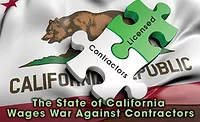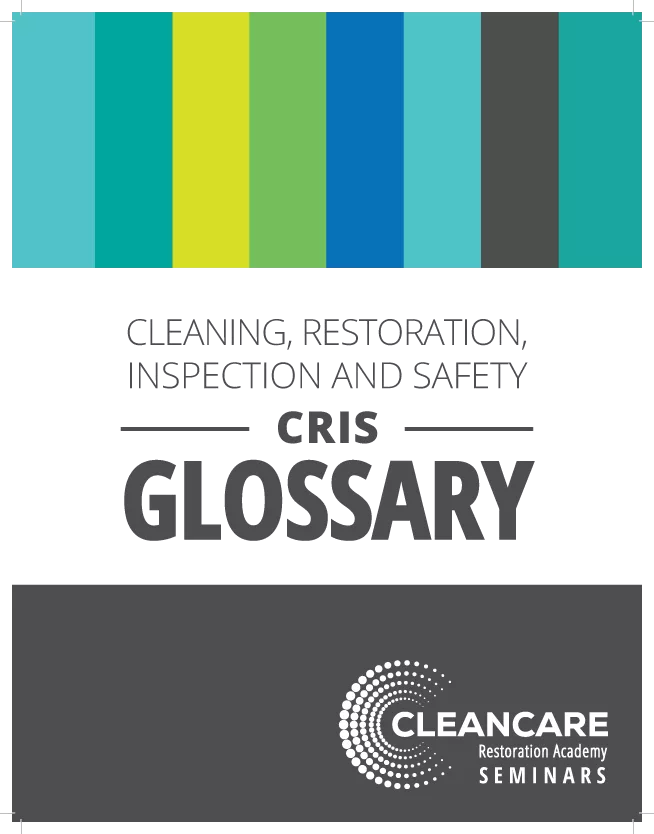California Debt Collection License for Restorers Explained
An FAQ From 'The Restoration Lawyer' Ed Cross

Photo credit: Ed Cross
The California Debt Collection Licensing Act (“DCLA” SB 908) takes effect on January 1, 2022. Certain terms in the law have not yet been defined, and there will likely be regulations to clarify the rules because many organizations are challenging the law and demanding explanations. I know it sounds bizarre, but for now, as currently written, the law generally requires licenses for creditors who regularly contact consumers regarding past due debts for goods or services, as explained below.
View the below video and FAQ for an explanation of the debt collection license for restorers.
What the @#%$! is this all about?
The Act was created to protect consumers from unscrupulous debt collection practices. Creditors who communicate with consumers to collect debts incurred for personal or household purposes must obtain a Debt Collection License from the Department of Financial Protection & Innovation (DFPI), unless an exception applies. Applications must be filed by December 31, 2021 to avoid violations.
I’m a restorer, not a debt collector, so why should I care about this?
We have yet to see an exception that would protect most restorers who do residential work in California and are not paid immediately. Review the exceptions here.
Should I apply for a debt collector’s license?
It appears that the law requires licenses for companies even if debt collection is not their primary business. As explained in the video, since restorers’ invoices are frequently past due, I have advised some of my clients to apply for the license because they contact homeowners to collect past due invoices for restoration services.
What is considered "debt collection"?
Under California law, “debt collection” means any act or practice in connection with the collection of consumer debt. The new law only applies to “consumer debt.”
What do they consider a "debt collector"?
A “debt collector” is “any person who, in the ordinary course of business, regularly, on the person’s own behalf or on behalf of others, engages in debt collection” (emphasis added).
What does "regularly" mean?
Unfortunately, the Act does not define “regularly,” and many organizations have demanded a definition from the State. It’s prudent to assume there won’t be an answer before the New Year’s Eve deadline. The Act clearly does not limit the license requirement to collection agencies.
- Courts often follow dictionary definitions. Merriam-Webster defines “regular” as something that is something done on a recurring basis and in conformity with prescribed usages, rules, or discipline.
- When deciding a case of first impression, courts also look to the way other courts handle an issue. If the California courts choose to look to the way federal courts evaluate whether an attorney is engaged in “regular” debt collection for purposes of the Federal Debt Collection Practices Act, they consider many factors, including (1) the absolute number of debt collection communications issued; (2) the frequency of the communications; (3) whether there is any pattern to the communications; and (4) whether the collector has personnel specifically assigned to work on debt collection.
We advise our restoration clients to be consistent with their collection efforts, to develop and follow a structured plan for collections, and to contact debtors frequently.
What is "consumer debt"?
The term “consumer debt” is defined as money, property, or their equivalent, owed for goods or services rendered on credit for personal, family, or household purposes.
Do I need the license if I don’t extend credit terms?
Britannica.com defines a “credit transaction” as one in which the provider furnishes goods or services in return for a promised future payment. Sections 7159 and 7159.5 of California’s Home Improvement Law forbid California contractors from collecting money until after residential work is performed. In sum, if it’s not a C.O.D. deal, there is a good chance it could be seen as a credit transaction.
What if my collection calls are “mostly” to insurance companies?
Calls to insurance companies are not the issue. It doesn’t matter what is done “most” of the time. What matters is whether there are “regular” communications with consumers about past due debts. Unfortunately, the State has not defined “regular,” but see the discussion above for some clues.
Was this the intent of the law, or is this an unintended consequence?
The intent is to cast a wide net to monitor all debt collectors so the State can spot abuses and terminate all collection activity of those who overstep. Pulling a license is almost like a restraining order. It creates a bigger legal obstacle than prosecuting violators for single acts. It will make it illegal for the collector to engage in any "debt collection" activity.
Can I continue doing business in California while my application is pending approval or denial?
Yes. According to the Debt Collection Licensing Act, any debt collector that submits an application prior to December 31, 2021, can continue to operate pending the approval or denial of the application.
Can I continue to collect consumer debts if I don’t submit an application by December 31, 2021?
Unfortunately, if the Act applies to you, the answer is no. If you fail to submit an application by December 31, 2021, you will be precluded from continuing to operate in California until you are issued a license. Moreover, the DFPI can take legal action against persons that continue operating without having submitted an application.
Do all my collections staff need individual licenses?
No. One license is all that is needed for the company. In fact, affiliated companies may be under a single license, subject to the approval of the Commissioner. The affiliates must be identified in the license application.
What if I have multiple branches in California?
A separate license is not required for each individual branch office. The license is issued to the principal office and covers the entire company.
What department governs this license?
The Department of Financial Protection and Innovation (DFPI) provides licensure, regulation, and oversight. You can reach the licensing team by emailing DCLA.Inquiries@dfpi.ca.gov.
What do I do first?
Carefully study all the information on the Debt Collection License home page, review the Application Checklist, and follow the link to “New Application.” Note that applicants must have an account with NMLS (Nationwide State Licensing System) available here: https://nationwidelicensingsystem.org/.
What if NMLS does not set up my account by December 31, 2021?
NMLS is really backed up with an unprecedented volume of account requests, and it may take several days. Fortunately, the DFPI web site states that it is aware of the temporary slowdown in setting up new NMLS accounts and acknowledges the "predicament" this creates for those attempting to comply. The site says DFPI will not take any action against a debt collector "solely" on the basis of the temporary slowdown with NMLS.
What do I do if I think I’m not engaged in debt collection but am not sure?
Many industries in California have responded negatively to the license requirement because they are not debt collection agencies. Unfortunately, the new law is not limited to collection agencies and explicitly applies to creditors collecting debts owed to them.
The DFPI has been flooded with requests from businesses as to whether the new law applies to them. In response, I'm happy to report that the DFPI put this on its website on December 29, 2021:
"The DFPI will not bring an enforcement action for unlicensed activity under Financial Code section 100001 if there is a bona fide legal opinion request, or similar request submitted in good faith via DCLA.Inquiries@dfpi.ca.gov, prior to and pending as of December 31, 2021, regarding whether a prospective applicant is “in the business of debt collection.”
The email must be sent no later than December 31, 2021. But for the reasons explained below, this probably provides very little protection.
What is a "bona fide legal opinion request"?
Unfortunately, the DFPI did not explain what would qualify as a "bona fide legal opinion request," but my view is that it should contain provable facts which suggest that the business is not "regularly" engaged in the business of consumer "debt collection." Be mindful of the definitions of “debt collector” and “consumer debt,” above! State your case as to why you do not believe the law should apply to you, but keep in mind the DFPI will probably take what you say at face value, so be careful about stating conclusions. For example, if you state that you do not regularly engage in debt collection, they could respond with a statement that no license is required, and then come back later and investigate your company and conclude the opposite.
What will response can I expect to receive when I send a request?
After inviting requests for “legal opinions,” DFPI sent at least one restorer a response stating that it cannot provide legal advice. No answer was provided to the question. Don’t be shocked or disappointed if the response you receive simply provides definitions and other quotes from the Act and tells you it’s up to you to figure out if it applies to you.
What will the Bona Fide Legal Opinion Request do for me?
The Request will supposedly free you of the license obligation by December 31, 2021 but only if you convince the DFPI you had a reasonable justification that you are not in the business of regular collection of consumer debts. But for the reasons explained above, I would not rely on this.
What do I have to do after I am licensed?
A licensee’s duties can be found in Fin. Code §§ 100018 – 100023 of the DCLA (Fin. Code § 100000 et seq.). Some of the duties are:
- Communications must display the license number of the collector in at least 12-point type.
- Licensee must file reports with the commissioner under oath.
- Must maintain a surety bond.
- Pay fees to Commissioner of Business Oversight.
These requirements may change, and regulations about the Act are expected.
How do I monitor the regulations?
For information regarding pending regulations please visit: Laws and Regulations – Debt Collection Licensing Act. You are responsible for complying with the law, including but not limited to the California Consumer Financial Protection Law (Fin. Code § 90000 et seq.) (CCFPL) and the DCLA.
What if a debt collector violates the law?
The Commissioner may issue a desist and refrain order to keep a company or individual from engaging in the business of debt collection without a license or from violating the DCLA or the Rosenthal Fair Debt Collections Practices Act or Civ. Code § 1788.50 et seq. The Commissioner may also order the person or licensee to pay ancillary relief, including but not limited to refunds, restitution, disgorgement, and payment of damages on behalf of a person injured by the conduct or practices constituting the violation.
Give me a shout if you have questions! (760) 773-4002
Keep the faith,
Ed Cross
PS: For information on how to maximize restoration receivables, click here.
DISCLAIMER: This material is for general information purposes only and are not intended to be legal advice. Seek the advice of a licensed attorney in all legal matters, including verification of the fitness of this Material for your particular purpose. We do not warrant that the accuracy of the presentations, materials or communications, or represent them to be completely free of errors when delivered. Those who use the Material do so at their own risk.
Looking for a reprint of this article?
From high-res PDFs to custom plaques, order your copy today!










